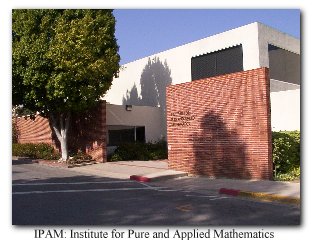| |
VIGRE at the Graduate Level
At the graduate level, these programs will help graduate students
to progress more rapidly from classroom learning to active participation
in research and to become more effective teachers.
- Summer program of preparatory
courses for graduate students prior to beginning graduate study
to provide a solid foundation for the first year qualifying exam
courses. This intensive review will be taken by beginning graduate
students before the start of the fall term of their first year.
The goal of this program is to provide students with the opportunity
to solidify and review fundamental material, thereby easing the
transition to graduate work and helping to ensure success in first-year
graduate courses. The program consists of two courses (each meeting
8 hours per week) that cover basic topics in algebra and analysis/topology.The
material covered in the summer program form the base upon which
the first-year courses will build.
- Streamlined first-year graduate
curriculum and qualifying exam process, together with reduced
teaching, to reduce time to degree.
Current exam system: There are general comprehensive examinations
at the end of the first or the beginning of the second year of
graduate study. These exams test for basic competency in analysis
and algebra for pure students and in analysis and fundamentals
of applied mathematics for applied students. The first year graduate
courses have been redesigned to prepare students for these exams
and the students have been able to pass them at the end of the
first year or the beginning of the second year.
- Teacher training and mentoring.
Teaching skills are developed by mandatory
participation in the Mathematics Departmental TA Training Program.
This program starts with a two-day introductory orientation
before fall quarter classes begin. It continues throughout the
fall quarter as a Teaching Assistant Practicum course. Students
also receive additional mentoring in connection with their independent
teaching. Students will be assigned a graduate student teaching
mentor.
Students will also have the opportunity to teach a full course
for which they will have principal responsibility, under the
supervision of a faculty mentor. The student will attend classes
taught by the mentor to get acquainted with teaching from the
perspective of the professor and to discuss teaching techniques.
In turn, the mentor will attend classes taught in the following
quarter by the student to offer further advice.
UCLA Mathematics Teaching Experience
is designed to provide graduate students with a firsthand
experience at the teaching of large undergraduate classes without
having to face the responsibility of actually running a full
course.
- Participating Seminars. Special participating
seminar courses (Math 290) introduce students to contemporary research topics
early in graduate study. Current seminars (Fall 2007) include:
- 290B Number Theory (D.M. Blasius, C. Khare)
- 290C Algebra (R.E. Greene)
- 290E Geometry (K. Liu)
- 290F Topology (R.F. Brown, R.E. Greene)
- 290G Analysis (J.B. Garnett, T.C. Tao, C.M. Thiele, G. Eskin, M. Hitrik, J. Ralston)
- 290J Applied Mathematics (T.F. Chan, A. Bertozzi, L.A. Vese)
- Summer Internship Program. Funding is available to support students in the summer months to
work on a research project with a mentor outside of mathematics,
on a project that uses mathematics as an integral component.
Recent internships have included work with faculty in Computer Science,
Anthropology, Electrical Engineering, Philosophy, Neurosciences, and
industry such as Rhythm and Hues and Digital Domain.
Here are links
to lists of recent internship projects.:
Internship Poster 2007
Internship Poster 2006
These programs are expected to ensure that the average time to PhD
is five years or less. 
Through the VIGRE program, graduate students are in a position
to take a diversity of courses on more advanced topics, covering
a wide range of potential research interests at the beginning of
their second year of graduate study. This has allowed students who
become interested in an interdisciplinary field to begin a serious
study of subjects outside the domain of traditional pure or applied
mathematics. The opportunity for interdisciplinary research has
been greatly enhanced with the tutorials and conferences at the
the Institute of Pure and Applied Mathematics on the UCLA campus.
In addition, students have to opportunity to learn about other research
areas through talks sponsored by the Biomathematics
Department and the School of Medicine. Vigre grads also benefit
by a wide range of talks sponsored by the department including weekly
Math Colloquiums
and the Distinguished Lecture
Series. Speakers have included I.M Singer, Jean-Pierre
Serre, Raoul Bott, and Sir Michael Atiyah.
Vigre students can also attend Perspective Seminars sponsored
by Graduate Student Outreach.
These talks organized by GSO expose beginning graduate students
to different areas of research done by faculty members. The seminars
help students focus on an area of specialization and new students
can determine which faculty member would best meet their needs &
interests as an advisor.
Post-doctoral
| Graduate | Undergraduate
| Research Clusters | Lecture
Series | UCLA Math Vigre Program
For questions or comments please contact webmaster@math.ucla.edu
|
